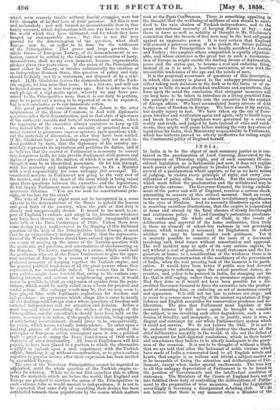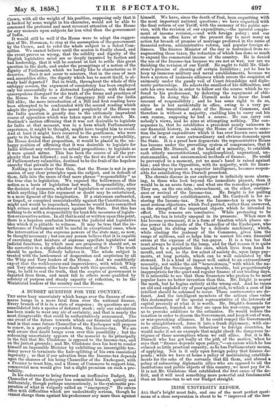INDIA.,
IF India is to be the object of such summary justice as is con- tained. in the proclamation of Lord Canning, disavowed by the , Government on Thursday 'night, and of such summary ill-con- , sideied legislation as is fashionable just now, it does not reqiiire much power of political prophecy to predict the result. The dis- avowal of a proclamation which appears; so far as we have means of judging, to violate every principle' of right, and everyl:cen- sideration of policy, alike, was inevitable. ` But the consequences which must follow the proclamation and the withdra'w'al May be grave in the extreme. The Governor-General, the living embodi- ment of the power and will of England, receives a serious check, amounting to censure at this critical moment. Such an event, however necessary, will have an almost revolutionary significance in the eyes of Hindoos. And its necessity illustrates again what is receiving countless illustrations, that the empire is jeopardized at home and abroad. by the fatal absence of steady forethought and continuous policy. If Lord. Canning's portentous proclama- tion, confiscating the whole soil of Oude, is the result of deliberation and. approval of the home authorities, then truly is there an element of school-boy rashness in our governing , classes, which renders it necessary for Englishmen to reflect whither we may be bound under such guidance. , Yet it is scarcely possible to conceive of the issue of a document involving such fatal issues without consultation and :approval. The evil incident may in spite of its very serious aspects, be not without a soul of goodness, if it recall statesmen and the Le- gislature at home, to a consideration of the weakness there is in attempting the reconstruction of the machinery of the government of India, when the real pressing- task of the moment is its pacifi- cation. It would. have been better if public men had devoted their energies to reflection upon the actual practical duties, ne- cessities, and policy to be pursued. in India, for stamping out the fire that is still raging, rather than on premature organic change. Had they done so it would not have been possible for a dis- credited Governor-General to force the executive into the predica- ment of censuring him, or enduring an act of monstrous cruelty and oppression. It is still not too late to retrace our steps : and to recur to a course more worthy- of the ancient reputation of Eng- lishmen and English assemblies for conservative prudence and de- liberation. The plea that Parliament must legislate at tins moment because it will never again be brought to consider the subject, is one involving such utter degradation, such a con- fession of frivolity, and incapacity, as to justify, were it true, a disgust and contempt for our whole Parliamentary system which it could not survive. We do not believe the libel. It is not to , be endured. that gentlemen should destroy the chanter of the , chief deliberative assembly in the world, to eke out the defect of,, the argument for half-digested resolutions, which in their hearts and. consciences they believe to be utterly inadequate to the great- , ness of the occasion. It is not to be thought of Without a blush, that we are told. that after the holocaust of noble victims which have made of India a consecrated land to all English minds and hearts, that empire is so tedious and trivial a subject-matter as to be incapable of fixing the attention and deliberations of Par- liament, except when under special excitements. The true key to all this unhappy depreciation of Parliament is to be found in . the position of Governments and the intellectual condition of statesmen. The Ministers of the Crown of England have not of ; late fulfilled their duty of controlling' the deliberations of- ment by the preparation of wise measures. And the Leislative
i
accordingly s becoming a disorganized. debating club. .1 We ,„ not believe that there is any moment when a Minister of the
Crown, with all the weight of his position, supposing only that it is backed .by some Weight in his character, would not be able to command the 'Profound and most reverent attention of the House for any pleasure upon subjects far less vital than the government of India.
It would still be well if the House were to adopt the sugges- tion of Mr. Horsman, to stop at the assumption of the government by the Crown, and to refer the whole subject to a Select Com- mittee. We cannot believe until the session is finally closed, and the event proves us wrong, that the solidity and dignity of the English legislative mind are so 'deeply impaired by faction and bad leadership, that it will be content' at rest to settle this great question in the dark, and under the •promiptings of a notion of the dignity of Parliament, which we hardly like to characterize as it deserves.' , Does it not occur to senators, that in the case of men and.aisemblies alike, the dignity which has to assert itself, is al- ready half departed ? But in truth, throughout the whole of this unhappy session, the argument of consistency has been employed only too successfully' to a distracted Legislature, with the most unscrupulous disregard for the truth of the forms and practices of the House.' In the case of the Conapiracy, Bill • and the India Bill alike, the mere introduction of is 'Bill and first reading have been attempted to be confounded with' he second reading which adopts the principle. And the moral perplexity of the House on the India question is greatly due to the extremely, imprudent course of opposition which was taken upon it at the outset. Mr. Bentinek's motion affirming that it was not desirable to legislate for India at that moment, was in a form which- Parliamentary experience, it might be thought, might have taught him to avoid. And at least it might have occurred to the gentlemen; who were party to its being made, that if, 'as there was every probability, the House denied that proposition, it would be placed in the un- happy position of affirming that it was desirable to legislate for India without any reference to actual propositions ; to legislate as it were quand meme. This has been the source of all the per- plexity that has followed ; and is only the first we fear of a series of Parliamentary calamities, destined to be the fruit of the hopeless anarchy that prevails in the House. Nothing is more clear than this, that the House is not in pos- session of any clear principles upon the subject, and in default of them, falls into the snare of that mere phrase " responsibility " as the true clue to legislation. We exposed the hollowness of this notion as a basis of legislation last week. Responsibility, after the decision of measures, whether of legislation or execution, upon which anything like fair argument or doubt may be entertained, is a mere figment of the imagination. If a statesman embezzled, or forged, or conspired unmistakeably against the Constitution, he might and would be impeached, because he would have committed high crimes and misdemeanours against the State. But this has nothing to do with a responsibility for bonâ fide measures of legisla- tionor executive action. In all thatie said or written upon this point, there is a hopeless confusion between the judicial and legislative idea which it is pitiable to witness.. It may be true that the in- terference of Parliament will be useful in exceptional cases, when the intervention'of the supreme powers of the state may, as now, be thought necessary; but can any person believe that it is capable of exercising that mixture of supreme appellate legislative and judicial functions, by which men are proposing it should act, as the corrective to a single absolute Secretary of State ? The truth should be spoken. Nobody believes it. The whole subject is treated with the lawlessness of desperation and scepticism by all the Whig and Tory leaders of the House. And we confidently expect that the recklessness and improvidence, with which Whig and Tory statesmen alike have dealt with this question, will, ere long, be held to seal the truth, that the sceptre of government is departed from them, and must fall to others more qualified by sobriety of purpose and steady capacity of reflection, to be the Ministerial leaders of the country and the House.



























 Previous page
Previous page